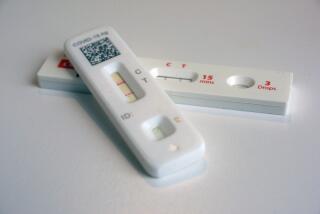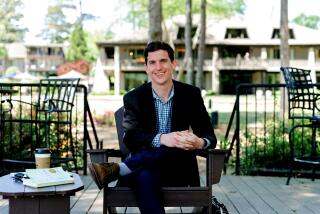An AIDS Diagnosis Is a Powerful Prescription for Discovering One’s Self
- Share via
From the day of birth, each of us is continually developing into the unique person who is the sum of all our life experiences. The passage from childhood to adolescence, and then adolescence to adulthood, is certainly never smooth. However, we manage to survive the various challenges and crises as part of the natural process of maturation toward our true, full selves. For those of us with AIDS, the process seems to come to a halt.
The diagnosis and sudden debilitating illness of pneumocystis carinii pneumonia (PCP) made me feel as if someone had pulled the rug out from under me. I found myself totally incapacitated, dependent on oxygen tanks, hospital staff, physicians and my family. Initially I had no choice, due to my weakened condition, but to accept the diagnosis and then give into it until I began to regain my strength and my symptoms subsided. I felt powerless and childlike, in a role totally foreign to me, and in an environment equally unfamiliar.
On the morning of the fifth day of my hospitalization I awakened feeling strong enough to evaluate just what had happened to me. I had inadvertently become a “victim” of this frightening and lethal disease, and I had allowed myself to go with it, but no more. I think in that instant I realized I could either choose to continue as a passive recipient of this sentence or boldly face what lay ahead of me and fight for my life. I was determined to regain control and channel the powerful rage over what had happened to me into the strength to beat this thing. I suddenly felt like “me” again; it was a heady, euphoric feeling. At that moment I literally challenged the AIDS virus, dared it to beat me.
My recuperation at home was slow, and I regressed physically, which was discouraging. But with a tremendous amount of love and support from family and friends, my health improved, although it never did--and likely never will--return to normal. I am learning to accept this reality and adjust my lifestyle accordingly. This has been one of the toughest hurdles to date.
After spending a lifetime building a future and developing an identity that is “me,” it is difficult to accept an intruder moving in and taking over. I have had to learn that the person I used to be is still very much a part of me. However, I must express myself differently now. The psychological adjustments I have had to make seem so profound that it’s as if there are two of me: the person I was before I became ill, and the person I am today.
I never imagined that I would be confronting my own mortality at this stage in my life. I am very much a realist, and so I have forced myself to imagine just what impact my likely early death might have upon my husband, my daughter, my family and my friends. I want to make certain that I have done what I can to prepare both myself and those I love so that there is as little pain as possible. This sounds so melodramatic that it’s hard for me to believe it is real.
Daily I must limit my activities due to varying degrees of fatigue requiring regular rests. I must constantly monitor my energy expenditure, due to the effects of the drug (AZT) that I take. To counteract this negative side effect, I am hospitalized and receive blood transfusions every four to five weeks to keep my red blood cell count at an acceptable level. It is as if I have X amount of available energy and must consciously and judiciously determine how best to spend it. Once a socially active person, I often feel isolated from the rest of the world, as if I’m being passed by.
I often feel self-indulgent, forever focusing on my own needs. But I am learning to accept this as necessary for my own survival. I used to pride myself on my ability to meet almost any challenge with enthusiasm and success. Now I must admit to myself that I have limits. There is always the underlying fear that, if I push myself too hard, physically or emotionally, I very likely could end up in the hospital again with a bout--this time fatal--of PCP.
I rely a great deal on family and dear friends. I attribute much of my good health to them and their loving, graciously given support.
My personal victories are fewer and farther between than they used to be, but I am still making them happen. I still seek challenges, although I must be resourceful in finding new personal strengths to tap. Granted, I have my days and weeks when all this seems too overwhelming, and I temporarily retreat into myself. But as long as I am able to continue to seek and experience the smaller joys in life that are so often overlooked, I will move on.


